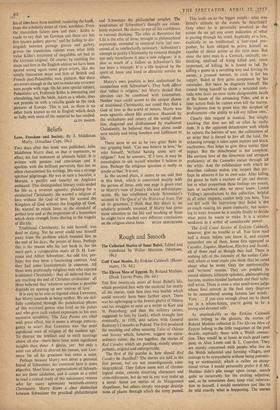Beliefs
Love, Freedom and Society. By J. Middleton Murry. (Jonathan Cape, 18s.)
Two days after this book was published, John Middleton Murry died, so that it represents, in effect,. his last testament of ultimate belief. It is written with passion and conviction and it sparkles with the brilliant perversity that has so often characterised his writings. His was a strange spiritual pilgrimage. He was in turn a Socialist, a Marxist, a pacifist and (nearly) an Anglican ordinand. This distinguished literary critic ended his life as a reverent agnostic, pleading for a secularised Christianity. He wanted a religion of love without the God of love. He wanted the Kingdom of God without the kingship of God. He wanted. to retain Jesus as the standard of perfect love and as the inspiration of a humanism which drew strength from sharing in the tragedy of His life.
Traditional Christianity, he told himself, was dead or dying. Yet he never could tear himself away from the problem which haunted him to the end of his days, the person of Jesus. Perhaps this is the reason why his last book is, for the most part, a comparative study of D. H. Law- rence and Albert Schweitzer. An odd trio, per- haps; but they form a fascinating contrast. And they had some fundamentals in common. All three were profoundly religious men who rejected traditional Christianity : they all believed that we are reaching the end of Christian civilisation : all three believed that 'whatever salvation is possible depends on opening up new sources of love.'
It is easy to be trite or bigoted about Lawrence, but Murry succeeds in being neither. We are skil- fully conducted through the paradoxical phases of this wayward genius who lived on his pulses and who gave such violent expression to his own excessive sensibility. The Last Poems are cited with great effect, but it seems a strange extrava- ganza to assert that Lawrence was 'the most significant man of religion of the modern age.' To distrust the intellect and to exalt marriage above all else—there have been more significant insights than these. A genius, yes : but only a saint can afford to distrust his reason, and Law- rence for all his greatness was never a saint.
Perhaps because Murry was never a personal friend of Schweitzer, his treatment here is more objective. Most lives or appreciations of Schweit- zer are sheer adulation, and it comes as a relief to read a critical study of this missionary veteran who for many epitomises twentieth-century Christianity. Murry draws a clear distinction between Schweitzer the practical philanthropist
and Schweitzer the philosopher prophet. The weaknesses of Schweitzer's thought are relent- lessly exposed. He claims to put all his confidence in rational thinking. 'The ethic of Reverence for Life is the ethic of Jesus, brought to philosophical expression, extended to cosmical form and con- ceived of as intellectually necessary.' Schweitzer's attempt to justify Christianity by rational thought not only transforms it into a new religion : it is also as much of a failure as Schweitzer's life has been a triumph. It is a life inspired by the spirit of Jesus and lived in altruistic service to others.
Murry's own position is best understood by comparison with Schweitzer's. They both affirm that 'ethics is religion,' but Murry denied that altruism can be combined with rationalism. Neither man could assent to the unique claims of traditional Christianity, nor could they find a God of love in the world of nature. Murry was even agnostic about His existence. Haunted by the wickedness and misery of the world about him, disgusted and, disillusioned by traditional Christianity, he believed that love alone could save society and bring freedom and fulfilment to life.
There seem to me to be two great flaws in this gripping book. 'Can one believe in love,' he asks himself, 'without having some sort of religion?' And he answers, 'If I love, it may be meaningless to ask myself whether I believe in love. Perhaps the religious question is really as simple as that.' It is not.
In the second place, it seems to me odd that in this book, which is concerned mainly with the person of Jesus, only one page is given over to Murry's view of Jesus's life and self-interpre- tation. He has swallowed whole Schweitzer's account in The Quest of the Historical Jesus. For all its greatness, I think that this thesis is, on scholarly grounds, unsound. If Murry had given more attention to the life and teaching of Jesus he might have reached very different conclusions on the religion about Jesus. HUGH MONTEFIORE


































 Previous page
Previous page